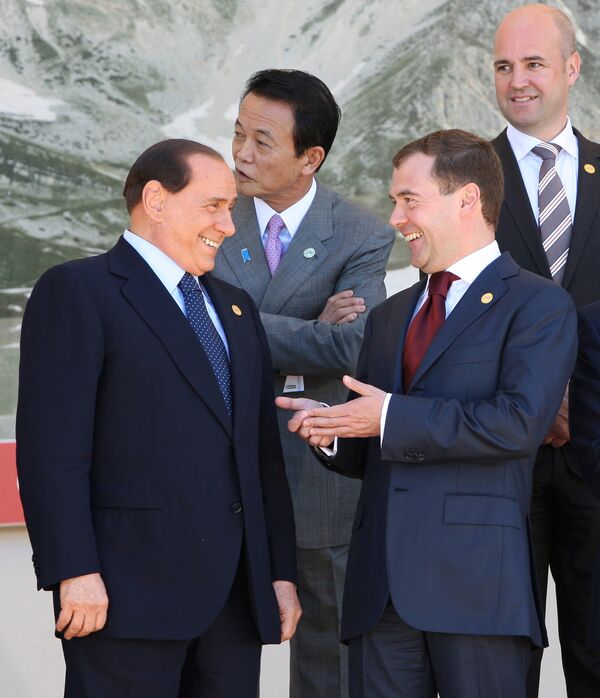MOSCOW. (RIA Novosti political commentator Andrei Fedyashin) -President Dmitry Medvedev arrived in Rome today for the "extended summit" between Italy and Russia taking place in Rome.
The summit is part of regular meetings between the two countries' governments, which have been held since 2002. Mr Medvedev has already visited Italy twice this year and met with Prime Minister Silvio Berlusconi many times. Usually the intergovernmental meetings cover economic, trade, scientific, legal and cultural issues, but this time they have a special significance, at least as far as the summit between the president and the prime minister is concerned.
It appears that Dmitry Medvedev has brought his latest proposals on revamping the entire European, or, to be more accurate, Euro-Atlantic, security system to Rome for a "first testing."
While the Eternal City by definition is probably not the best place to have the first discussion of the new European security architecture (eternity is the opposite of novelty), the Palazzo Chigi (the residence of Italian prime ministers) is quite suitable for the task at hand, as is Silvio Berlusconi.
Mr Berlusconi, known for being independent-minded, stubborn, and extremely outspoken, has repeatedly stated that he would support friendship with Russia if it meets his and his country's interests, despite the opinions of, as he put it, "some liberal democrats or Canadians."
One of Mr Berlusconi's economic advisers once mentioned that Il Cavaliere has even "had a vision" that close strategic relations with Russia would be beneficial for Italian businesses, and he has followed this vision ever since.
In general, Mr Berlusconi gives preference to those interests that have a practical application and bear real results. This approach is no doubt quite cynical, but it seems to be prevalent in big business and politics.
Relations with Russia became a priority as early as 1994, during Mr Berlusconi's first term in office. He became the first Western leader to sign a Treaty of Friendship and Cooperation with Moscow. This rational amicizia (friendship) continued through Vladimir Putin's time as president and prime minister, and is set to continue under President Medvedev.
Choosing Italy as the venue to present the new security system to Europe for the first time is probably a good idea, but, alas, it will hardly provide an opening into Europe.
The proposed agreement on the new security system, which is based on the principle of the "indivisibility of security" and the "creation of a single, undivided space" in the Euro-Atlantic region, is somewhat concerning and even frightening for Europe and the United States. They have always been averse to any comprehensive proposals originating from the enormous territory that was first called Russia, then the U.S.S.R., and then Russia again. Both European stereotypes about Russia and, to be completely honest, Russian behaviour itself, are to blame for this mistrust.
The EU and NATO view the proposed agreement as either redundant, considering the existence of NATO, the OSCE and several other documents on European security, or as an implicit attempt to eliminate NATO altogether.
NATO is currently conducting a regular, once-a-decade review of its strategy to ensure member states' security.
It is highly unlikely that the alliance will agree to incorporate President Medvedev's global and ambitious proposals on European security into this strategy. Behind the scenes of the alliance (NATO is currently discussing the proposed agreement), they are already saying that NATO will under no circumstance change its obligations to guarantee the security of its member states. In other words, the West believes that NATO is such a cornerstone of the European security system that it would be completely unreasonable and extremely expensive to replace it with any other option. It appears that even Italy can do nothing to help.
Therefore, it is unlikely that the first presentation of the new security system in Europe will be successful. In the best-case scenario, it will be politely accepted as a first draft to be discussed for months to come.
The opinions expressed in this article are the author's and do not necessarily represent those of RIA Novosti.



